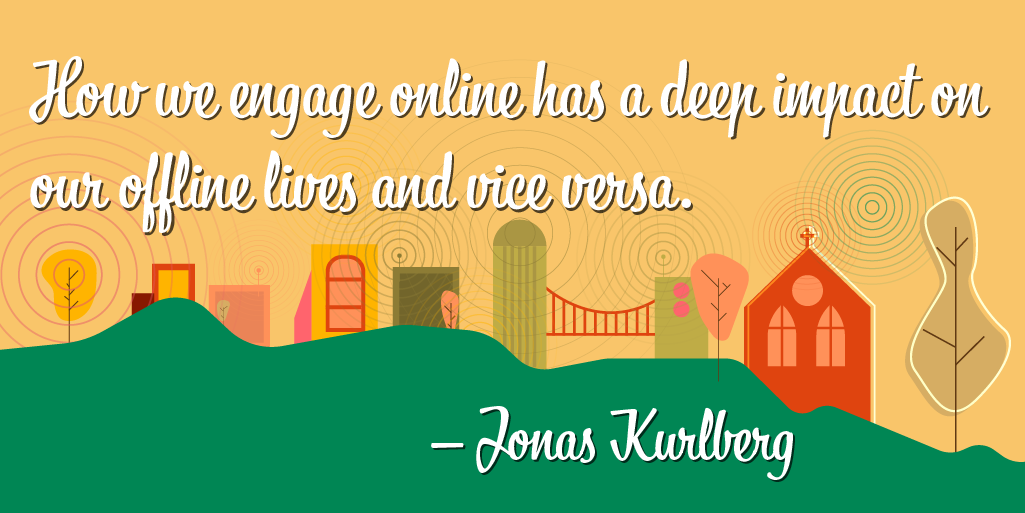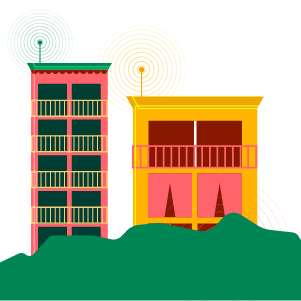Digital media is now an unavoidable fact of life for many across the world. What does this mean for our Christian communities?
For an increasing proportion of the global population, digital forms of communication are becoming normalised in everyday life. A telling statistic in the latest We Are Social annual report is that the world’s five billion internet users on average spend nearly 2.5 hours a day on social media.
This has a bearing on how we communicate and relate with one another. Relationality is deeply embedded in the biblical narratives and is central to theological anthropology, ecclesiology, and even soteriology. Being in communion with one another is constitutive of the imago Dei and is at the centre of Christ’s redemptive work to which the church bears witness as a reconciled community.
As such, digitally mediated communication relates to issues which are at the core of the Christian faith. Regardless of how one assesses digital media and its impact on our communities, it has for many become an unavoidable fact of life, and digital culture is for churches across the world part of the context we find ourselves in.

The ‘Authenticity’ of Online Community
Over the last few years, I’ve led a number of workshops on church and digital technology for various groups. My anecdotal observation is that groups primarily consisting of digital migrants tend toward discussions about the authenticity (or lack thereof) of online community.
In contrast, when raising questions about the ‘realness’ of digital fellowship amongst Gen Zers, I’ve often been met with blank faces. For digital natives, online and offline communication is largely viewed as seamless and continuous. This reflects what some sociologists have been suggesting for well over a decade—namely, that the internet should not be understood as a separate dimension that we visit from time to time, but as a reality increasingly embedded into our everyday lives.
the internet should not be understood as a separate dimension that we visit from time to time, but as a reality increasingly embedded into our everyday lives.
The ‘digital dualisms’ that make sharp distinctions between the online / the offline are therefore unhelpful. That is to say, how we engage online has a deep impact on our offline lives and vice versa. The emotional impact of online trolling is felt as strongly as harsh words in a heated in-person conversation. We post messages on our social media feeds about life events and we use messaging apps to arrange catch-ups with friends. We strengthen the bonds of fellowship through video-conferencing with family members living in different parts of the country. The impact and implications of digitally mediated communication are real, and therefore, to ask whether online relationships are ‘authentic’ is to ask the wrong question.

The Quality and Nature of Online Community
This does not mean, however, that digital media technology has no impact on how we relate to one another. A legitimate concern is that of the quality and depth of online communities. Overall, online communities tend towards weaker ties with lower levels of commitment and more fleeting connections. These could, as such, be dismissed as superficial and inadequate reflections of the koinonia suggested in Acts 2:43-47.
However, making a distinction between strong and weak ties within communities, theologian Katherine Schmidt suggests that it is impossible to be intimately connected with everyone within our local congregation. Conversely, she argues that weak ties are integral in sustaining communities. It is also here that digital technology can play an important role. Social media and messaging apps create the possibility of staying in touch with one another throughout the week. Requests for prayer, messages of encouragement, or reminders of upcoming events can knit communities together. In ways such as these, digital communication technology can serve to supplement existing practices. Pitting online and offline engagement against each other is simply a false dichotomy.
Pitting online and offline engagement against each other is simply a false dichotomy.
To affirm that online communities are primarily sustained by weak ties is not to deny the deep sense of Christian fellowship that some have found online. Many have felt supported through engaging in online forums, sharing experiences of disappointment, bereavement, and suffering. For some at the margins of our communities, the internet has enabled them to overcome social and physical barriers that would otherwise hinder them from meaningful engagement and participation in Christian fellowship.
Furthermore, the possibility of connecting with Christians from other parts of the world can be enrichening. We should be careful not to belittle these experiences of community as second rate, or to universalise our own negative experiences of digital communication. At the end of the day, the quality of any relationship or community is difficult to measure since it is to a great extent subjective.
ARTICLE
Ten Questions That Will Shape 2050
The answer to these questions will impact the world and the Great Commission. Let’s start talking.
Further, the partial suspension of geographical limitations has the potential to strengthen the church universal. How we work as the Lausanne Theology Working Group exemplifies this. Video-conferencing technology permits us to meet regularly across time zones, exchange views and ideas from all corners of the world, and thereby connect in ways that would have been cumbersome in the pre-digital era. In this way, the use of digital media technology serves to build the church universal.
Admittedly, the digital divide means that many are still excluded from the possibility of participating in the ‘universal virtual church’. Yet as internet access is rapidly expanding in the Global South, it is already contributing to processes of reshaping power imbalances that soften the theological and ecclesial dominance of the Western church (see chapter 7 in Theologies and Practices of Inclusion).![]()
Intentionality and Online Community Building
Highlighting these positive aspects of digital media is not to diminish the very real issues that have emerged in the wake of the internet. Media reports regularly feature its negative impact on mental health, the polarisation and erosion of trust in our societies, the narcissistic tendencies of self-branding, and manipulation through persuasive technology.
As Angela Gorrell suggests, new media presents both ‘glorious opportunities and profound brokenness.’ This demands that we invest in ‘interested conversations’ about digital media as opposed to unreflective responses, whether enthusiastic adaptation or dismissive rejection.
Thus, as in any relationship and community building endeavour, online engagement requires a level of intentionality. Many of the same virtues and habits that are imperative for flourishing personal relationships and fellowship also apply to digitally mediated communication.
Many of the same virtues and habits that are imperative for flourishing personal relationships and fellowship also apply to digitally mediated communication.
There are, however, a few things that we need to be particularly mindful of. For example, we meet people on a regular basis and in specific contexts that give us clues as to how we might interpret their communication. In contrast, some scholars have suggested that online engagement can suffer from ‘context collapse’. When meeting on video-conferencing platforms we should, to counter this, be deliberate about introducing one another so that we at least have a basic awareness of the people in the room.
Or to give another example, a tweet, which is an extremely limited form of communication, can easily be misunderstood because of a lack of understanding of its context. An awareness of this should impel us to give people the benefit of the doubt when interpreting their communication. Whilst the extent to which social media has a causal impact on polarisation is today disputed, the trend towards heightened divisions in our societies is deeply problematic as it erodes trust between people. And trust is the currency of any functioning society and community.
As ambassadors of Christ, we are called to a ministry of reconciliation (2 Cor 5:18). This at a minimum requires us to cultivate habits of attentively listening to those with whom we disagree online and offline.

Networked Communities in Digital Culture
Digital communications not only delimit and/or create new possibilities for fellowship—they change the dynamics of our communities such that they challenge our traditional institutional models of church.
One of the defining characteristics of online communities is that they are not geographically bound. This fact has contributed to a wider trend towards networked structures of society. Part of this shift has to do with globalisation and urbanisation, but it has certainly been amplified by the advent of the internet. In the past, Christian fellowship was largely confined to the local church. In today’s networked societies, Christians are likely to be part of multiple groups and communities that provide spiritual nourishment: connections with previous local churches, ecumenical church groups, homegroup/cell groups, para-church organisations, Christian conferences, WhatsApp prayer groups, Facebook Bible study groups, online discussion forums, and streamed online services from around the world.
In the past, Christian fellowship was largely confined to the local church. In today’s networked societies, Christians are likely to be part of multiple groups and communities that provide spiritual nourishment
The downside to this is that a networked approach to community could become consumeristic. It allows individuals to pick and choose which communities they engage with according to their likes and preferences, with limited commitment or accountability. The risk is that this panders to a self-oriented spirituality in which groups and communities are used to meet our own spiritual needs. Such a consumerist attitude seems like a far cry from the outward looking vision of discipleship—of loving God and neighbour—that Jesus advocated.
On the positive side, however, in order to sustain our faith in often pressured contexts, we need to find spiritual communities that do nourish us. In a networked society we have the possibility of enriching our spiritual lives by engaging with different communities across the world with divergent spiritualities, styles, and ways of worshipping. At a minimum, this reality ought to impel church leaders to reflect on both their role as pastors and the way that discipleship is managed in digital culture

An Ongoing and Wider Conversation
Digital technologies are not monolithic. Different devices, software, apps, and platforms create different affordances and limitations that each require careful consideration. Further, the pace of innovation and the human re-negotiation thereof means that our theological responses constantly need to be re-evaluated.
For these reasons, my comments here should be seen as a small contribution to what is necessarily a wider collaborative and ongoing conversation within the church. What I hope to have made clear is that we cannot afford to unreflectively muddle through the digital age. Digitalisation is unfolding before us at a frightening pace, and its implications will be felt upon the church for decades to come. We need to ask ourselves how we are going to negotiate these shifts so that our communities continue to flourish and bear witness to God’s reconciling work through Christ.
Photo Credits: Photo by rawpixel



